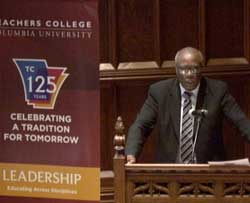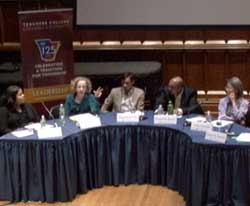A Book as Diverse as its Topic
The authors of the 700 signed articles include no fewer than 17 Teachers College’s faculty members, students and staff. In late April, five of those contributors joined the Encyclopedia’s editor, James A. Banks, at a launch event in Milbank Chapel. Provost Thomas James introduced Banks, the director of the Center for Multicultural Education at the University of Washington in Seattle and a former Tisch Distinguished Lecturer at TC, as “a longtime friend of the College and an honorary part of this community.”
Simply figuring out how to approach such a massive topic was so daunting, Banks said, that he resisted the project for a year after his editor at Sage Publications invited him to take it on. A key principle he insisted on, he said – but also one that vastly complicated his work -- was that “diversity variables are not discrete but interactive, interrelated, dynamic, complex and contextual.” In other words, no group is a monolith, and no individual is defined by just one facet of his or her identity. Instead, a mix of individual and social differences is constantly at play, and education – like other fields – must adopt suitably supple responses.
With that principle, known as intersectionality, in mind, the Encyclopedia is organized into 18 subject areas. Some focus on particular aspects of diversity (for example, Socioeconomic Status, Gender and Sexual Orientation) but most are thematic (Curriculum Issues and Pedagogy, K-12 Education, Testing and Assessment, and so on). Three sections treat education and diversity outside North America: in Europe, Asia and the Middle East.
The TC contributors on the panel shared highlights from their Encyclopedia entries, each a concise but full-fledged scholarly article. They included Anand Marri, Associate Professor of Social Studies and Education, on social studies and diversity; Celia Genishi, Professor of Education, on diversity and early childhood education; Gary Natriello, Ruth L. Gottesman Professor of Educational Research and Director of the Gottesman Libraries, on online assessment and diversity; Erica Walker, Associate Professor of Mathematics and Education, on math teaching and diversity; and Anna Neumann, Professor of Higher Education, on the idea of culturally-anchored liberal education. (A full list of TC contributors to the Encyclopedia appears below.)
“As John Dewey said, democracy must be learned,” Marri said, and in social studies, diversity – being a particularly important trait of a democratic society – is a subject for study itself. That challenge to schools is heightened by the fact that students today have an intuitive sense of difference, Marri said. “They’re pretty smart. They readily acknowledge that American society has unequal dynamics, and they’re aware of multiple histories.” It’s up to the schools to match this sophistication in civics, history and economics instruction. “Instead of simply adding on narratives about various groups to existing curricula, the curriculum itself should be explored in depth.”
In mathematics, by contrast, teachers often rankle at learning about diversity and its role in their teaching, said Walker. “It’s often suggested that mathematics is gender-neutral, color-blind and culture-free,” she said. “But how we encounter math is not neutral.”
Low expectations of math performance by students from minority groups are pervasive in the school system, Walker said. Students are quick to categorize themselves as “math people” or “non-math people.” One problem is that students are rarely shown the contributions of women and minorities to the field. But mathematics teachers should become familiar with teaching practices for diversity, “not only for content and curriculum, but also instruction and assessment.”
In early childhood education, the “key diversities,” as Genishi put it, exist not only among students but also among the settings in which education takes place and the teachers who provide it. From family day care to Head Start to pre-K classrooms, and from certified teachers to care providers with little formal training, early childhood education is a complicated mosaic, but presents some important patterns. For instance, due to the cost and time commitment of teacher education programs, “staff with degrees and certification are more likely to be white,” Genishi said. She cited TC’s Quality Universally Inclusive Early Responsive Education (QUIERE) scholarship program, for master’s degree students who will work with children with disabilities and their families, particularly from immigrant backgrounds, as an example of initiatives to right these imbalances.
The “general education” function in higher education – the core that makes up about one-third of the typical college course-load – is an area where colleges confront diversity, both in framing the curriculum and in serving a student population that is more ethnically and racially diverse than at any time in history, said Neumann. “Liberal education today should be responding to demographic change – and also to the knowledge, values, cultures, desires and aspirations that our students bring to class,” she said. “We should see those as materials from which curriculum building can begin its work.”
Some topic sections in the Encyclopedia include consideration of how diversity interacts with innovations in the field. Online assessment, for instance, is a recent development, and as a result, Natriello said, “there has not been much work done yet on online assessment and diversity. In my entry, I talk about some wonderful opportunities, when we move assessment online, for thinking about diversity in a more profound way and having it pervade our thinking on assessment.” Using multiple media, making tools increasingly flexible and personalized, and embedding assessments into other activities, all have potential to “make assessment as diverse as the styles, dispositions and cultures of the students,” Natriello said.
But we are not there yet, he warned. “A lot of online assessment looks like the assessment that preceded it in the offline world. We’re replicating the problems that we had before.” Hence the value of a tool like the Encyclopedia – not only to improve assessment but to infuse with diversity the education field as a whole. “A resource that sensitizes people to these issues is important,” Natriello said. “We have a chance to get it right – but only if we’re armed and informed.”
The following TC community members contributed to the Encyclopedia of Diversity in Education:
Liza Bolitzer, doctoral student TC Higher Education program
Limarys Caraballo, Instructor, TC Department of Curriculum & Teaching
Milagros Castillo, Instructor, TC Higher and Post-Secondary Education program
Peter W. Cookson Jr., former TC faculty member, founder of Ideas Without Borders
Chad d’Entremont, TC alumnus and Executive Director at Rennie Center for Education Research and Policy
Katie Embree, Associate Vice Provost
Celia Genishi, Professor of Education
A Lin Goodwin, Vice Dean and Professor of Education
ZhaoHong Han, Professor of Language and Education
Luis A. Huerta, Associate Professor of Education and Public Policy
Rachel H. Kim, TC alumna
Anand R. Marri, Associate Professor of Social Studies and Education
Gary J. Natriello, Ruth L. Gottesman Professor of Educational Research and Director of the Gottesman Libraries
Anna Neumann, Professor of Higher Education
Thomas P. Rock, Director of Enrollment Services
Derald Wing Sue, Professor of Psychology and Education
Erica N. Walker, Associate Professor of Mathematics and Education
Anne Winiarski
Published Friday, Apr. 26, 2013


